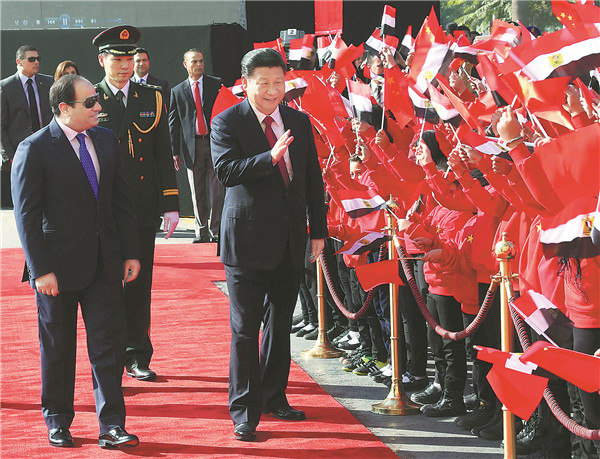Xi's speech on era of opportunity in Cairo welcomed by observers
By XING ZHIGANG in Cairo and ZHANG YUNBI in Beijing (chinadaily.com.cn) Updated: 2016-01-22 18:39
 |
|
Children cheer as Egyptian President Abdel-Fattah al-Sisi walks with President Xi Jinping at the presidential palace in Cairo on Thursday. [Photo/Agencies] |
Observers said concrete aide measures proposed in President Xi Jinping's latest Middle East policy speech are "pragmatic and effective" in addressing the region's thirst for stability and economic re-invigoration.
When addressing the Arab League at its headquarters in Cairo on Thursday afternoon, Xi stressed the need to "advance industrialization in the Middle East" and carry out production capacity cooperation.
"China's competitive production capacity and the human resources in the Middle East, when combined, will deliver more and better job opportunities for the region," Xi, who is on a three-nation trip to the Middle East, said.
Xi announced that China will set up a $15 billion special loan for industrialization in the region to be used on production capacity cooperation and infrastructure projects in regional countries.
China will launch a $20 billion joint investment fund with the UAE and Qatar to primarily invest in traditional energy, infrastructure development and high-end manufacturing industries in the region, Xi said.
China and the Middle East "need to make good use of the coming five years", the crucial period to jointly build the Belt and Road Initiative, Xi said.
Li Guofu, a researcher of Middle East studies at the China Institute of International Studies, said Xi had set the target of realizing the measures proposed in the upcoming five years "in order to make sure benefits are delivered faster to people of both China and the Middle East".
Xi's speech displayed China's latest philosophy that will help address regional hotspot issues, and has reaffirmed China's commitment to not interfering in domestic affairs of regional countries, Li said.
Wang Yiwei, director of the Institute of International Affairs at Renmin University of China, said: "China's successful experience in the process of modernizing itself has greatly inspired and encouraged the Arab countries to explore their own developing pathways that adapt to their respective national conditions."
- Xi offers development as 'new path' to resolve Middle East crises
- Cartoon Commentary on President Xi's Middle East visit ③: Opening new era of Sino-Egyptian partnership
- Xi outlines Middle East vision
- Xi says China not to seek proxies or fill 'vacuum' in Middle East
- Xi's Middle East visit: Consolidating regional diplomacy




